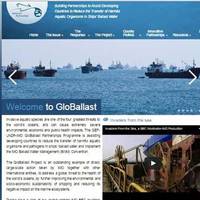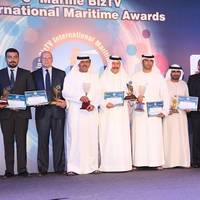From GloBallast to GloFouling Partnerships
Global Environment Facility (GEF) approves new project concept to address major aquatic invasive species vector. A new global project to help protect marine ecosystems from the negative effects of invasive aquatic species has been given the go-ahead for preparation. The GloFouling Partnerships project – a collaboration between the Global Environment Facility (GEF), the United Nations Development Programme (UNDP) and the International Maritime Organization (IMO) – will address the transfer of aquatic species through biofouling, in other words, the build-up of aquatic organisms on a ship’s underwater hull and structures. The project will focus on the implementation of the IMO Guidelines for the control and management of ships’ biofouling…
GloBallast Story Published at UN Ocean Conference
During the 20th century, tiny organisms carried in the ballast water of ships began to be recognized as alien invasive species. These aquatic species were hitching a ride across the oceans and some were embedding themselves in new areas, multiplying and becoming harmful invasive aquatic species. The impacts on native species, local ecosystems and sea-based economies have, in some cases, been devastating. The story of how global partnerships, governments, industry, academia and other stakeholders came together to tackle this problem is told in a new publication, The GloBallast Story, launched (6 June) during a side event at the UN Ocean Conference in New York.
What’s Next for Ballast Water Management?
Latest developments on the entry into force of the Ballast Water Management (BWM) Convention took centre stage at the 8th International Conference on Ballast Water Management (24-25 April) in Singapore. International Maritime Organization (IMO) Secretary-General Emeritus, Koji Sekimizu, and Chief Technical Advisor of the GEF-UNDP-IMO GloBallast Partnerships Programme, Jose Matheickal, delivered keynote addresses at the event. Among other key issues, participants discussed the revised guidelines for the approval of Ballast Water Management Systems (G8), challenges facing Port State Control with regards to Compliance Monitoring and Enforcement (CME) and the timeline for installation of BWM systems.
Project to Address Marine Bio-invasions Concludes
A decade-long project to promote implementation of an international treaty stemming the transfer of potentially invasive species in ships’ ballast water has reached a successful conclusion at a meeting of stakeholders from Governments, industry and UN bodies. The International Maritime Organization (IMO) has been executing the GloBallast Partnerships Program in collaboration with the Global Environment Facility (GEF) and the United Nations Development Programme (UNDP). The project was launched in 2007 after an initial 4-year phase and has been assisting developing countries to reduce the transfer of harmful aquatic organisms and pathogens in ships’ ballast water and implement the IMO Ballast Water Management (BWM) Convention.
Online BWM Tools Launched

A new online learning portal including a free e-learning course on the Operational Aspects of Ballast Water Management (BWM) was launched today by the GEF-UNDP-IMO GloBallast Partnerships Program and the Global Industry Alliance (GIA). The online tools have been developed by the GloBallast project, with financial support from the GIA to assist with the wider implementation of the International Convention for the Control and Management of Ships' Ballast Water and Sediments, 2004 (BWM Convention).
UNDP and IMO Chiefs Meet

United Nations Development Program (UNDP) Administrator Helen Clark met International Maritime Organization (IMO) Secretary-General Koji Sekimizu at IMO Headquarters on January 20, where the two highlighted common commitment to sustainable development and discussed the important role of maritime transportation in building the economies of developing countries. The leaders noted the two multimillion dollar partnerships projects executed by IMO in partnership with the UNDP to address the threat of invasive species in ships’ ballast water.
BWTS Test Organizations Launch GloBal TestNet Group
A new formal group of organizations involved in testing for the certification of ballast water treatment systems has been set up, known as the “GloBal TestNet,” to facilitate increased standardization and harmonization of test procedures and information exchange. The move is expected to benefit test facility clients as well as the end-users of ballast water treatment technologies: the ship owners who need cost-effective and environmentally-friendly systems to meet the requirements of the International Convention for the Control and Management of Ships' Ballast Water and Sediments (BWM Convention), 2004. A Memorandum of Understanding (MoU) establishing the GloBal TestNet was signed on October 21…
IMO’s GloBallast Partnerships Awarded “Best Innovative Project”

The award was presented during the sixth Marine BizTV International Maritime Award ceremony, held in Dubai, United Arab Emirates, on May 15, 2013. The jury, in considering the most innovative and creative achievements of global and regional maritime organizations and their initiatives, agreed to award the IMO-UNDP-GEF GloBallast Partnerships Project the “Best Innovative Project” award for its role in catalyzing the global efforts to find innovative technological solutions for…
BWT on Agenda for IMarEST
The introduction of non-native species via the discharge of ship’s ballast water is one of the main threats to marine biodiversity, with alien species often capable of out-competing native species – effective ballast water management (BWM) and the dissemination of good practice are thus essential throughout the marine community, which is why the Institute of Marine Engineering, Science and Technology (IMarEST) is the host of a BWM Special Interest Group, the Ballast Water Expert Group (BWEG). ‘Friends of BWEG’ include the International Maritime Organization’s GloBallast Partnerships Project, which is supporting the inaugural IMarEST Ballast Water Technology Conference, with its theme ‘Impending Convention Requirements and Challenges’.
Funding Approved to Combat Invasive Species in Ballast Water
Funding for the GloBallast Partnerships project, to assist developing countries in reducing the transfer of harmful aquatic organisms in ships' ballast water, has been approved by the intergovernmental Council of the Global Environment Facility (GEF), enabling the project to enter an exciting new phase. The main objective of GloBallast Partnerships (full title: Building Partnerships to Assist Developing Countries to Reduce the Transfer of Harmful Aquatic Organisms in Ships' Ballast Water) is to assist particularly vulnerable countries and/or regions to enact legal, policy and institutional reforms to meet the objectives of the International Convention for the Control and Management of Ships' Ballast Water and Sediments (BWM convention), adopted by IMO in February 2004.
IMO Presents Ballast Water Documentary
Tiny alien invaders transported in ballast water star as the villains in a new documentary film on harmful organisms in ships’ ballast water launched on March 23 by IMO, the United Nations agency responsible for the safety and security of shipping and the prevention of marine pollution by ships, and BBC Worldwide. The documentary film, “Invaders from the Sea”, which will be broadcasted/distributed on television worldwide, shows that harmful organisms transported in ballast water by ships have caused biological and economic havoc around the world, largely due to the expanded sea trade and traffic volume over the last few decades. The…





